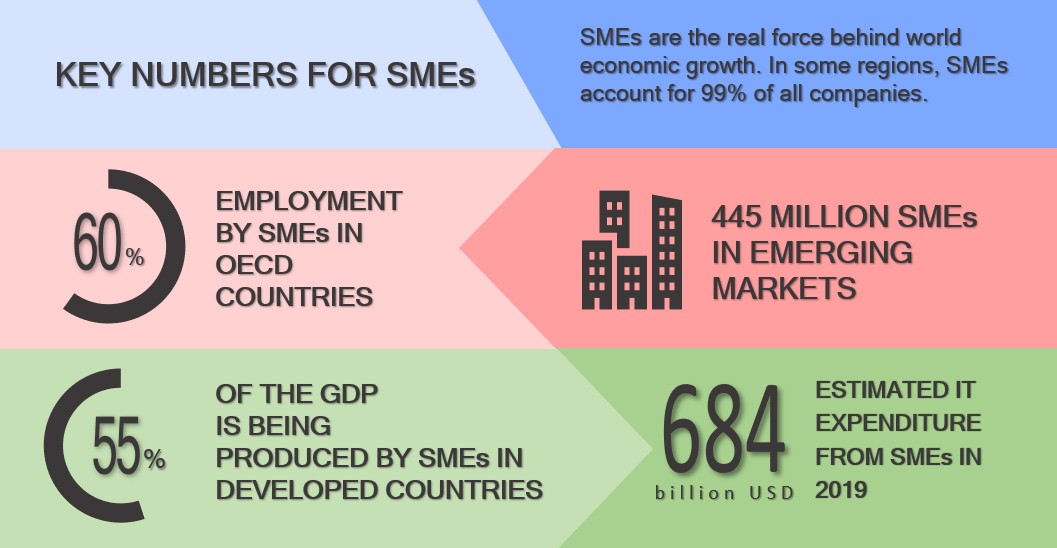
Being an SME has its own difficulties. Accessing financial instruments can be a headache. Increasing revenue is always a concern. Innovation is a big question mark. Uncertainty over economic conditions makes life even harder. And now there’s a new challenge: Digital Transformation (DX).
DX is not a popular trend. It’s a powerful concept. It’s a unique blend of improved customer experience, data-backed decision making, move from metrics to analytics, redesign of business functions with AI (Artificial Intelligence) support, leveraging the efficiency of business processes. World Trade Organization defines it as “the future of world trade”. That sounds like a change of paradigm for large enterprises, but SMEs are no exception.
SMEs are an essential part of world economic activity. Not only because they heavily outnumber large enterprises worldwide, but they also generate more GDP (Gross Domestic Production) in developed countries, they provide more employment and they contribute to gender equality better than big companies. Truth is, their growth and sustainability matter to the global economy and their commitment to DX is the key to it.

But DX doesn’t come easy for most SMEs. Financial limitations, lack of qualified technical staff, old habits, everyday business routines are the most common drawbacks, that makes SMEs less ambitious about creating a realistic and solid DX strategy. That’s why, many SMEs feel satisfied with having a web presence and/or using social media or installing some popular software suites. But taking the shortest way out, will increase the technological gap even bigger.
The way an SME approaches DX is much different from a large enterprise company. An SME has very limited margins for mistakes, since they would experience financial consequences, if they don’t spend their scarce funds properly. Their customer-outcome-focus is not comparable to the organizational focus of a large multinational enterprise. Nevertheless, their strength is right there. The implementation of technology can be completed much faster and the process of decision making is significantly shorter. Not to mention, SMEs size is a big advantage, when overcoming the institutional resistance to adopt a new technology or system.
A well-defined DX strategy and initiative touches every corner of the organization, from daily business activities to employment policy, as well as its customers. Some essential aspects of digital transformation are:
Transformation of business model
DX offers a big opportunity to create and serve new values. However, that usually requires a complete change in the way an enterprise does business. A great example is Netflix. Once a DVD delivery service, they realized, their past success would not guarantee their future in the digital age. They created a new, innovative business model based on the data collected by their recommendation algorithm. The outcome was a high valued digital product, which replaces legacy TV with streaming media.
Transformation of customer experience
New digital technologies have caused a shift in customer expectations. The new modern customer is aware of technology and has new standards in the age of digital business. To accommodate with their needs, organizations are required to digitize the products and services as part of the value ecosystem, while staying relevant to them.
Transformation of data
The need to use data in a meaningful way emerged, when technology improved the capacity to collect and store big volumes of data for enterprises. Yet today, aggregating data has evolved into analytics. Analytics is one of the most important instruments for an organization to compete in the digital economy. Data-backed decisions became the centerpiece of enterprise strategy.
Transformation of infrastructure
Infrastructure is the foundation of every kind of digital product or service and host of any software and interaction gateway to customers. Digital transformation requires a continuous, reliable, secure, mission-critical IT infrastructure.
Transformation of business processes
The transformation of legacy operations becomes a priority, while the effectiveness and efficiency of business processes are being questioned with the goal of operational excellence. Not surprisingly, according to IDG, 31% of IT executives say, BPM (Business Process Management) is their most important technology project currently. Almost 2/3 of the organizations have increased their funds for process management projects this year.

The needs for process management of SMEs are acuter. In the long term, their tolerance for inefficient business processing estimated to be quite low. By implementing BPM, back-end work of an enterprise can be streamlined, continuous processes calibration can be enabled, and resources can be freed up for the next value-added action. To maximize the effect in short term, the primary focus of BPM should be on business processes, where human execution is most utilized. Automation of manual activities brings big improvements. This will also reduce the risk of error and significantly boost the efficiency of reengineered processes.
While the traditional relationship between IT and business collapse, technology becomes an integral part of organizations. Big data, AI, IoT (Internet of Things), block-chain, BPM, analytics have been hyped in recent years and it’s true, that they provide improved opportunities to adopters. SMEs also have little choice but to follow their customers and partners. However, SMEs should navigate their transformation very carefully and equip themselves with the necessary technologies. But not without a solid strategy.
